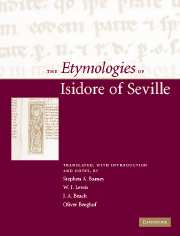Book contents
- Frontmatter
- Contents
- Acknowledgements
- Note to the Reader
- INTRODUCTION
- THE ETYMOLOGIES
- Analytical table of contents
- Book I Grammar (De grammatica)
- Book II Rhetoric and dialectic (De rhetorica et dialectica)
- Book III Mathematics (De mathematica)
- Book IV Medicine (De medicina)
- Book V Laws and times (De legibus et temporibus)
- Book VI Books and ecclesiastical offices (De libris et officiis ecclesiasticis)
- Book VII God, angels, and saints (De deo, angelis et sanctis)
- Book VIII The church and sects (De ecclesia et sectis)
- Book IX Languages, nations, reigns, the military, citizens, family relationships (De linguis, gentibus, regnis, militia, civibus, affinitatibus)
- Book X Vocabulary (De vocabulis)
- Book XI The human being and portents (De homine et portentis)
- Book XII Animals (De animalibus)
- Book XIII The cosmos and its parts (De mundo et partibus)
- Book XIV The earth and its parts (De terra et partibus)
- Book XV Buildings and fields (De aedificiis et agris)
- Book XVI Stones and metals (De lapidibus et metallis)
- Book XVII Rural matters (De rebus rusticis)
- Book XVIII War and games (De bello et ludis)
- Book XIX Ships, buildings, and clothing (De navibus aedificiis et vestibus)
- Book XX (Provisions and various implements)
- APPENDIX Correspondence of Isidore and Braulio
- INDEX
Book XX - (Provisions and various implements)
Published online by Cambridge University Press: 22 September 2009
- Frontmatter
- Contents
- Acknowledgements
- Note to the Reader
- INTRODUCTION
- THE ETYMOLOGIES
- Analytical table of contents
- Book I Grammar (De grammatica)
- Book II Rhetoric and dialectic (De rhetorica et dialectica)
- Book III Mathematics (De mathematica)
- Book IV Medicine (De medicina)
- Book V Laws and times (De legibus et temporibus)
- Book VI Books and ecclesiastical offices (De libris et officiis ecclesiasticis)
- Book VII God, angels, and saints (De deo, angelis et sanctis)
- Book VIII The church and sects (De ecclesia et sectis)
- Book IX Languages, nations, reigns, the military, citizens, family relationships (De linguis, gentibus, regnis, militia, civibus, affinitatibus)
- Book X Vocabulary (De vocabulis)
- Book XI The human being and portents (De homine et portentis)
- Book XII Animals (De animalibus)
- Book XIII The cosmos and its parts (De mundo et partibus)
- Book XIV The earth and its parts (De terra et partibus)
- Book XV Buildings and fields (De aedificiis et agris)
- Book XVI Stones and metals (De lapidibus et metallis)
- Book XVII Rural matters (De rebus rusticis)
- Book XVIII War and games (De bello et ludis)
- Book XIX Ships, buildings, and clothing (De navibus aedificiis et vestibus)
- Book XX (Provisions and various implements)
- APPENDIX Correspondence of Isidore and Braulio
- INDEX
Summary
i. Tables (De mensis) 1. Daedalus was the first to make a table and a chair. The first to devise the equipment for cooking was a certain Apicius, who died by his own choice, after stuffing himself with dainties – and deservedly so, because he who is slave to his maw and to gluttony kills both the soul and the body. The word ‘table’ (mensa) was made from ‘eating’ (esus) and ‘consuming’ (comesus), for a table has no other use. 2. A couch (torus) is so called from the twisted (tortus) grasses that are placed under the shoulders of those reclining on it. The ‘semicircular couch’ (stibadium) is named from log (stipes), as if it were stipadium, because it began as such. The ‘large dining couch’ (accubitum) is so called from food (cibus), as if it were ‘for the food’ (ad cibatum) of a banquet.
3. Among the Greeks a banquet (convivium) derives from the idea of ‘drinking together’ (compotatio), from their word ποτός, “drink.” But in Latin it is more correctly derived from ‘living in company’ (convictus), or because there one has conversation about life (vita). Again, convivium from a multitude of ‘people eating together’ (convescentes), for a private table is for sustenance, but it is not a banquet. A banquet has three elements: reclining, eating, and drinking. Reclining, as (Vergil, Aen. 1.708):
Bidden to recline on the decorated couches.
Eating and drinking, as (cf. Vergil, Aen. 1.723)
After the first lull in the banquet, when the tables were removed, they set out great bowls and garland the wines.
- Type
- Chapter
- Information
- The Etymologies of Isidore of Seville , pp. 395 - 406Publisher: Cambridge University PressPrint publication year: 2006

